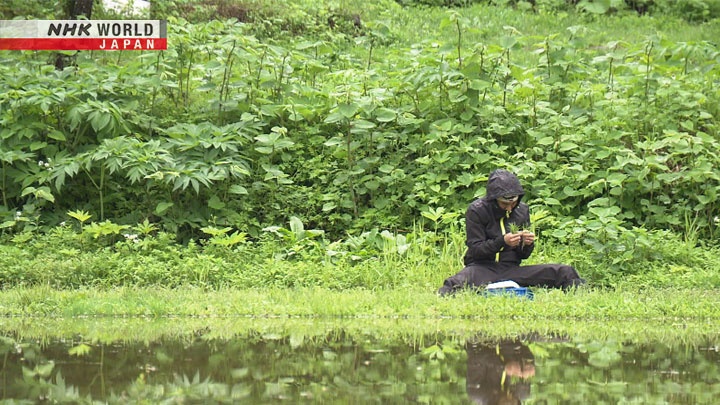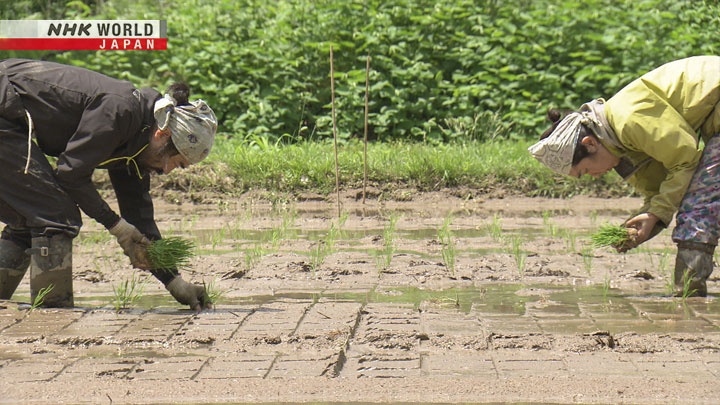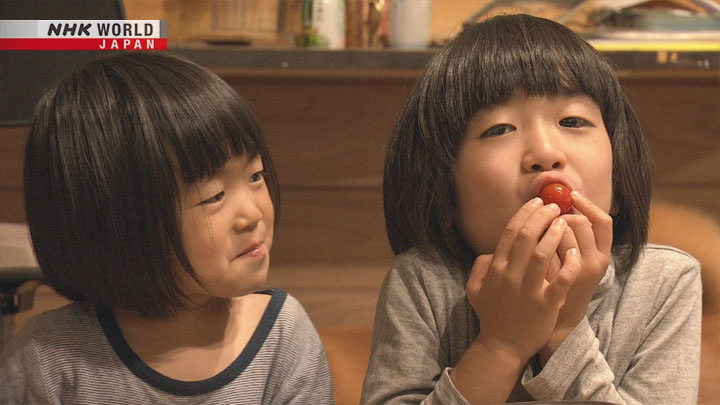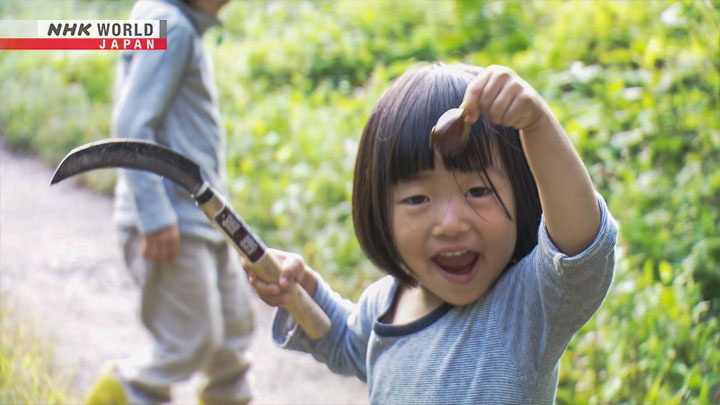Sometimes it takes a lifechanging event to help us realize what truly matters. For Kimura Tomoharu, that event was a massive earthquake and tsunami. In 2012, he sought a fresh start in a remote part of Akita Prefecture. He moved into a long-abandoned hamlet, where he pursues his goal of being almost entirely self-sufficient — living off the land from season to season. But he's not alone. Kimura has a family, and he must now balance his own ideals with those of his two young children.






Transcript
Folk lived here until the year 2000.
But for the next twelve years,
there was nobody.
It is possible to be self-sufficient.
We want to achieve that here, somehow.
It's our dream.
Akita Prefecture, northern Japan.
And in a long-abandoned mountain hamlet - signs of life.
A young man settled here soon after a massive earthquake and tsunami devastated northeastern Japan in 2011.
He wanted to carve out a life of his own.
A life in which he could rely on nobody but himself.
But out of the blue - a woman.
They marry.
Soon come the children.
And the story of a lone man becomes the story of a unique family.
Again!
OK!
Daikichi!
I'm gonna fall!
Earth-shaking events like natural disasters and pandemics,
they flip our lives upside down in an instant.
And oftentimes, they remind us about what matters most.
The Tehaizaka district in Akita can be found at the foot of the Shirakami mountain range - a UNESCO World Heritage site.
And nestled among the trees lies the tiniest of hamlets.
Spring 2021.
Much of the world has been in the grips of the coronavirus pandemic.
But not Tehaizaka - where the Kimuras wake to another quietly busy day ahead.
This is wormwood.
— Do you like it?
— Yup.
Tiny bamboo shoots.
Tasty?
— No?
— I got the tough part.
You have to cook it a bit.
It's a little bitter.
There's no TV in the house.
And no cell-phone reception.
The god of the hearth.
You may wonder if he's smiling.
If you've been bad, he'll look angry.
Looks like he's smiling.
The Kimuras make their meals with homegrown rice.
Bundling the seedlings is painstaking work.
But after several days, they're finally ready.
No matter what happens,
I can always grow rice.
Just soil, seeds, and my labor.
That's what I've learned.
At first, I was all alone.
But I wanted to take the hard way.
To start from nothing,
then develop a particular way of life.
And this was the perfect place.
Tomoharu's radical shift started when the 2011 earthquake and tsunami
struck his hometown in Miyagi Prefecture.
We people rely on things from elsewhere.
Be it energy or food.
And when disaster strikes,
our lives are suddenly unsustainable.
But it wasn't like that on the farms in
Miyagi. Not even after the disaster.
The farmers grew their food in the fields
or stockpiled rice.
And firewood allowed them to go without
electricity or gas.
I think that means a lot.
Because we don't know when the next
disaster will come.
Ikuyo was born and raised in a different part of Akita.
— "How did you meet?"
— You mean us two?
Now, how did we meet?
I know you're not going to tell.
My mother read about him in the papers.
"Here's someone just like you," she said.
So I got curious.
And decided to go see for myself.
I came to Tehaizaka,
and got really excited, like: Wow!
A place like this actually exists.
I was so surprised.
I made myself at home.
Became like family, sort of.
Tomo's parents started to ask,
"Aren't you two going to get married?"
And I would say to him, "Hear that?"
"Not such a bad idea."
Or at least I thought so.
I don't know about him.
But I wanted us to get married.
So, was it a good idea?
Well, we'll find out in time.
Yes, the future is what matters.
The Kimuras only want to grow enough rice and vegetables.
Nothing more.
What started out as Tomoharu's dream has become a way of life for his family.
The tadpoles are still here.
— "Are they?"
— Yes.
Here.
— Caught one.
— "So you did."
It's growing legs.
Starting to look like a frog.
See the stomach?
— You can see through it.
— "Really?"
It feels great to wade into the paddy
in rice-planting season.
A ruddy kingfisher.
They're so noisy during mating season.
You hear them, and know
it's the season of love.
Really nice.
Mom, let me up there.
I'll hang on, like this.
Hold tight.
Ready, set, go!
Again!
One more time!
OK! Stop!
Summer.
The vegetables are coming on nicely.
— What about today? Language, math and...?
— Music.
Hibiki started elementary school in spring.
— It's just right.
— A perfect fit.
I couldn't get used to school.
Nervous every single day.
Not so much fun, really.
Go, go!
Hibiki seems so happy at school.
I think it's great.
He may ask to do afterschool activities.
Pursue various interests,
as he finds his own way.
I want to help him do all he wants to do.
But I'm not sure we can.
Financially, I mean.
The moms I know are saving.
Not us.
We can't possibly do that.
Making money...
It's not among our goals in life.
So what should we do?
I really don't know.
A few years ago, Tomoharu started to take on part-time jobs.
We can't manage without at least some income.
That's the harsh reality.
But work for money five days a week?
That would be meaningless out here,
living in a thatched-roof house
without any modern comforts.
Fireflies.
Wow! Caught one.
A real firefly.
Watch it fly away.
"Amazing."
— They're over here.
— Yes. So many.
Mina, watch me catch one.
Like this.
— Mina wants to hold one.
— OK. Here.
Don't let it get away.
Clasp your hands tight.
It's walking.
It's alive. One more time?
Let me!
There are always essential tasks when the seasons change.
Careful.
Good job.
We're saving zucchini seeds.
Saving zucchini seeds.
— "What are you going to do with them?"
— Plant them.
Plant them.
Yes, next year.
Next year.
We're sowing the seeds, right?
Sowing.
Traditional, indigenous vegetables
will keep thriving.
As long as the conditions are right.
Done already? That was quick.
Tomato, tomato...
— Tomato, tomato...
— No, no, not yet.
They have to be ripe.
Otherwise, the seeds will not have grown.
Here's yours, Mina.
Don't eat it, though.
I'm just looking.
I'm hoping this will help them
learn about the circle of life.
They'll remember doing this.
It's sure to stay with them.
And when they grow up,
maybe they'll look back.
And want to do it themselves.
1, 2, 3, 4, 5, 6, 7, 8, 9, 10
— Here goes!
— Take about 10.
I'm gonna start here.
Where should I put them?
— Let me.
— OK. Mina, you try.
Ready?
— Was that quick enough?
— Yes, you're a big help.
That thing.
"What's that?"
It's a binder.
Binder.
"What does it do?"
Mows the rice plants.
Mow.
Dad, how do you stop?
Squeeze here with your left hand.
Which one's left?
Got it?
Got it.
One, two, hup, hup.
Hup, hup.
— I brought lots.
— Wow, thanks Mina.
— Are you OK?
— My shoe came off.
The crispy part looks good.
Not scorched black.
It's brown. And it smells brown.
— Nice burnt aroma.
— Smells crispy.
There's more soup if you want.
It's not just delicious, but a joy.
We have enough rice to last a year.
That's the fundamental part.
It's such a relief.
We now prepare for spring before the snow
comes. And then start again in April.
Snow.
And lots of it.
Great for the kids.
Not so for adults.
It's about 2 meters deep here.
Maybe more.
Like a big slide.
We can make a huge slide
from the roof to the ground.
The old woman who lived here
used to say so.
Welcome home.
Dad's home!
Daddy, Daddy!
— Want to film me shovel snow?
— "Now?"
No, a quick nap first.
Then work from 1 AM till morning.
— Really? Tonight?
— Yes.
I'm in charge of this area,
clearing snow from December to March.
You need a license for big motors.
I can earn about 2,000 yen an hour.
And I may even get a raise in a few years.
Records show the Tehaizaka village hamlet dates back more than 200 years.
But it's remote, and inaccessible by car during winter.
One by one, the residents left for good.
By the year 2000, there was nobody left.
When Tomoharu arrived here 12 years later, the house had fallen into disrepair.
And the land was far from arable.
He set about plowing the fields and rethatching the roof.
Little by little, he brought the place back to life.
I fixed the house, worked the fields.
All from nothing.
I got a sense of accomplishment,
but at some point I also felt burnt out.
I was pursuing an ideal lifestyle,
but we're social beings.
We can't stay totally isolated.
Honestly, I'm at a bit of a loss.
I've already let things slide off balance.
As the children grow up, their horizons start to broaden.
Having fun?
These days, Hibiki mostly looks forward to watching anime at the only spot with a signal.
What's the title?
Never mind that.
He's allowed to watch for 30 minutes.
But that rule often goes out the window.
He asks for my phone to watch YouTube.
It's becoming more frequent.
Personally, I'd rather
we cooked meals together.
Or even shovel snow.
But I wonder if it's a good idea
to be indifferent to what he wants.
To not meet his various needs.
I know that makes him miserable.
And that pains me.
I want my kids to smile,
and to enjoy the life we have here.
But do they? I wonder.
Dear Hibiki,
Happy 7th birthday.
Thank you for being in our lives.
You are a true blessing.
Your smile and sense of humor
always bring us comfort.
I'll try to be a more loving mom
for you and Mina,
and make more time to play with you.
I want you to laugh a lot, play a lot
and keep thriving.
We're always here for you.
Happy birthday.
Happy birthday.
Happy birthday.
— Ready?
— Yes.
Hup, hup.
I'm going faster.
You're doing great.
Keep up the pace.
— Why are we making miso today?
— It's the right time - nice and cold.
— Enough? A little more?
— Keep going a little longer.
— Why?
— It's still too grainy.
A little bit is good. But if there's too much
it takes longer to turn into miso.
— Don't spill it on purpose.
— I didn't mean to.
Of course you didn't. I'm sorry.
— I can't see!
— I can see that!
Mina's become more self-assertive.
— That's good.
— Good? OK.
The soybeans they mashed will be fermented in a barrel for six months.
— Look, a ball!
— A ball!
Go "bang," Mina.
Throw them into the barrel.
— Can I throw it really hard?
— Yes, as hard as you can.
Yeah! Here it comes.
Bang!
— How's that? Good?
— Pretty good.
— Good, Mina. Isn't this fun?
— Really fun.
Our own special miso.
— It'll be good miso.
— Yes, delicious.
— We made lots.
— Lots.
Didn't we, Mom?
Now put on the heavy lid.
All set.
All rise.
The school year is almost over.
The students draw pictures on their bags.
My Pikachu turned out really good.
Most children draw anime and computer game characters.
Super Mario and Luigi.
And what about Hibiki?
Going to eat cherries, jelly, watermelon.
— "Who's going to eat them?"
— The king.
— "That's the king?"
— Yes, and these are the kids.
— It's a story I made myself.
— "Wow."
And we're off!
The snow has melted, at last.
And one by one, the Kimuras plant the seeds again.
— Tap, tap.
— Mina, that's enough.
Now over here.
Mina, careful. Not so hard.
Do it gently.
Tomoharu is spending more and more time outside the hamlet.
He's not one to readily ask for help.
He keeps everything pent up inside.
It must be hard after a while.
He's a free spirit.
Someone who thinks differently.
But if he's physically and mentally tired,
the inspiration runs dry.
He probably feels lost.
But he'll be OK, I think.
Just give him a little time.
He'll be back with a vengeance.
He needs to go at his own pace,
and be his natural self.
"Where are you off to today?"
A job interview.
"What kind of job?"
Caretaker for national forests.
Something like that.
When I first came here,
I wanted to be totally self-sufficient.
Home, clothes and food.
I wanted to survive
entirely on my own.
But my ideals then are not
my ideals now.
My situation has changed.
I'm living with my family.
That's something I hadn't felt before.
Now, it's more about striking a balance
between my ideals and reality.
And to sustain our lifestyle here.
I'm not trying to compromise, though.
It's just, I now see less point in suffering
by clinging to my ideals.
Everyone joining the drill must wear
a life jacket, helmet and boots.
Tomoharu has been invited to do some volunteer work with the local fire brigade.
Mr. Kimura, do you drink coffee?
— I do.
— Here. Make yourself at home.
So what do you do now?
This and that. Part-time jobs.
Growing rice and vegetables.
I might get to do some contract work
for the Forestry Agency, too.
Work in the mountains three times a week,
and earn a decent wage.
You're a man of many talents.
Just be yourself, and you'll be fine.
You're very hard-working.
The folks here are all impressed.
The bell's early today.
It's Dad!
— It's him.
— Here he comes!
Look!
Bye Dad, we're rooting for you.
That was great.
I've been totally free to do what I like.
I wanted to live here.
I chose this lifestyle for myself.
I want my kids to have a happy life.
But it's not something I alone can give.
They have to find it themselves.
All I can do is try to give them
as many opportunities as possible.
The sky is brightening up.
It'll stop raining before too long.
— "How did the interview go?"
— It went well.
The call came a while ago.
I got the job.
— So all is well?
— All is well.
I'm glad.
So what do you think?
We're good. I think.
— Good last year, and good this year?
— Yes.